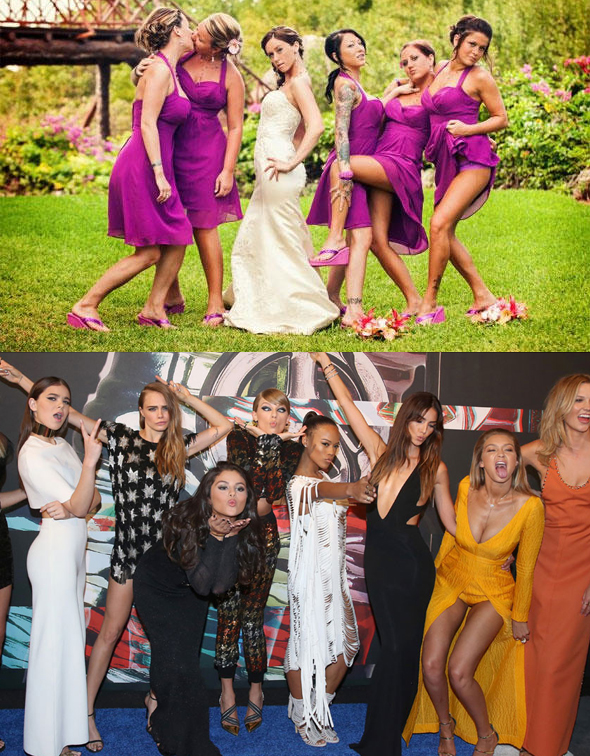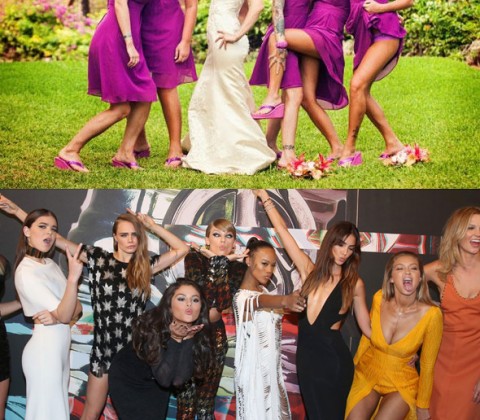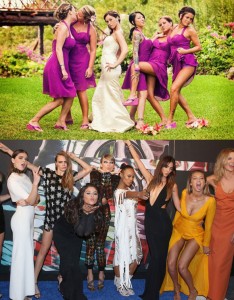

Are bridal parties the same as Taylor Swift’s “Nazi-Barbie” Girl Squad?
Hollywood reporter, Camille Paglia is taking umbrage against Taylor Swift’s girl squad, which she describes as a “Nazi-Barbie routine.” Paglia reflects on Swift’s appropriation of girl power squads from the 1990s, e.g. The Spice Girls, Def Squad, to promote a sense of women-empowered camaraderie through social media, in-person staged appearances and the pervasive selfie. After reading her fair but also pretty scathing review where she ultimately describes Swift as a “fascist blonde,” I can’t help wonder if there are lots of similarities between Swift’s posse power and bridal parties?
After all, nowadays both gams of gals thoroughly shoot selfies during their shared adventures and weddings utilize customized social media hashtags even more these days (#SmithWedding). Where weddings were once shared through analog album covers, now everyone who wasn’t invited to the wedding can watch with either awe, envy or support at publicly, shared photos in online communities like Instagram or Facebook. Men enjoy much different roles in Swift’s Hollywood and entertainment field, much like groomsmen in wedding culture. And like Paglia, I wonder what is it really promoting?
I’m happy for any bride who feels loved and supported by their surrounding friends, but in my experience the bridesmaid role supports old school ideas of domesticity and gender roles – hosting wedding showers with kitchenware, catching the bouquet, assisting in wedding tasks, etc. When the bridal party appears smiling in photos with their matchy bridesmaid dresses, like Swift’s squad in their decked out fine fashions, they’re only supporting the wedding industrial complex not any profound example of how friendship can improve the lives and equality of women. And like Swift’s squads online presence, in wedding media there’s too often a push towards demographic homogeneity. In both, everyone is alike – skinny, beautiful, cis, white, hetero, affluent. Both rarely depict any real diversity. As The Feminist Bride, I wonder what if traditional wedding tasks did not simply relegated the bride and her entourage to obsolete domestic or gender roles? What if, for all the seeming happiness of a bridal party, what if there’s massive room for improvement?
Paglia puts it into perspective, “Girl squads ought to be about mentoring, exchanging advice and experience and launching exciting and innovative joint projects. Women need to study the immensely productive dynamic of male bonding in history. With their results-oriented teamwork, men largely have escaped the sexual jealousy, emotionalism and spiteful turf wars that sometimes dog women.”
So as Paglia challenges Swift’s feminism and how she creates this public sense of girl power, I also challenge brides and bridesmaid to think constructively how they can support each other during a wedding. Maybe it’s not about getting her that wedding registry blender for her kitchen, but buying that GMAT book so she can get into a good grad school program? Maybe it’s about understanding that girl power can be found with friends who may not be cis, white, hetero or – gasp – even a woman. Maybe it’s not about expecting bridesmaids to make centerpieces or wedding invitations and it’s about making wedding planning a shared responsibility between fiances? Getting together, supporting and enjoying each others company is a wonderful experience for anyone to have among friends, but done in such a girl-centric and public platform, it’s important to consider what the power of the group is really accomplishing and who or what is also benefiting from it?

